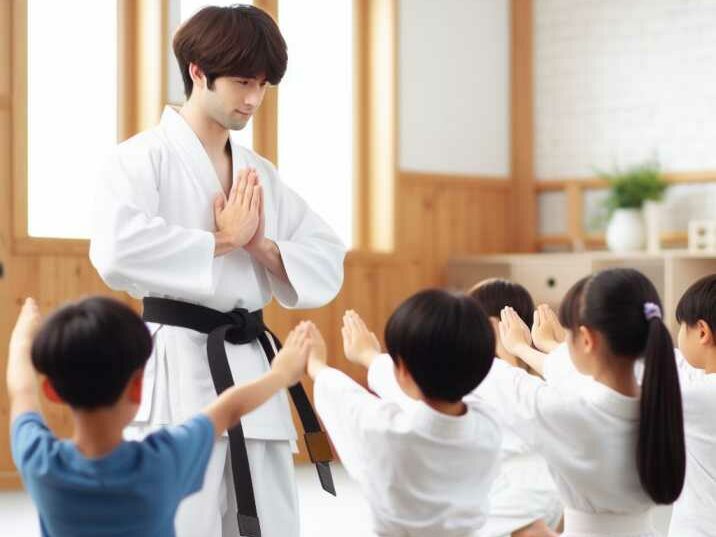Introduction
Table of Contents
Is Taekwondo Good for Kids?
In today’s fast-paced world, parents are constantly seeking activities that not only keep their children physically active but also contribute to their overall development. Taekwondo, a Korean martial art known for its dynamic kicking techniques and emphasis on mental discipline, has gained popularity worldwide, especially among children. But is Taekwondo good for kids? Let’s delve into this question and explore seven compelling reasons why Taekwondo can be incredibly beneficial for children’s development.

1. Physical Fitness
In an era dominated by screen time and sedentary lifestyles, Taekwondo offers a refreshing alternative by promoting physical fitness and agility. Through a combination of dynamic kicks, punches, and cardiovascular exercises, children participating in Taekwondo classes develop strength, flexibility, and endurance. Moreover, the structured nature of Taekwondo training helps children establish healthy exercise habits early in life, which can significantly contribute to their long-term well-being.
2. Self-Discipline and Focus
One of the core principles of Taekwondo is self-discipline. Children are taught to follow instructions, adhere to rules, and maintain focus during training sessions. These valuable skills not only translate to the Taekwondo studio but also carry over to other aspects of their lives, including academics and personal relationships. By learning to control their impulses and concentrate on tasks at hand, children become better equipped to navigate challenges and achieve their goals.
3. Confidence Boost
Participating in Taekwondo empowers children and boosts their confidence levels. As they progress through belt levels and master new techniques, they gain a sense of accomplishment that translates into improved self-esteem. Additionally, the supportive environment fostered in Taekwondo dojos encourages children to overcome their fears and step out of their comfort zones, ultimately building confidence that extends beyond the martial arts arena.
4. Respect and Courtesy
Respect for oneself and others is fundamental in Taekwondo philosophy. Children learn to bow to their instructors and fellow practitioners as a sign of respect, fostering a culture of courtesy and mutual appreciation. This emphasis on respect extends to everyday interactions, teaching children to treat others with kindness and consideration both inside and outside the Taekwondo studio.

5. Self-Defense Skills
In an unpredictable world, knowing how to defend oneself is a valuable asset. Taekwondo equips children with practical self-defense techniques that can help them stay safe in various situations. By learning how to assess threats, react effectively, and protect themselves when necessary, children gain a sense of empowerment and security, enhancing their overall well-being.
6. Goal Setting and Achievement
Taekwondo is structured around a belt-ranking system, providing children with clear goals to strive towards. As they progress from one belt level to the next, they learn the importance of setting goals, working diligently, and persevering in the face of challenges. This process instills in them a sense of resilience and determination that extends far beyond the martial arts context, shaping them into motivated and goal-oriented individuals.
7. Stress Relief and Emotional Well-being
Physical activity has long been associated with stress relief and improved emotional well-being, and Taekwondo is no exception. The rigorous training sessions serve as a healthy outlet for pent-up energy and emotions, helping children release stress and tension in a constructive manner. Moreover, the supportive community environment in Taekwondo dojos provides children with a sense of belonging and camaraderie, fostering positive social connections that contribute to their overall happiness and mental health.
Conclusion
In conclusion, Taekwondo offers a myriad of benefits for children, encompassing physical fitness, mental discipline, self-confidence, respect, self-defense skills, goal setting, and emotional well-being. By enrolling their children in Taekwondo classes, parents can provide them with a holistic developmental experience that lays the foundation for a healthy and fulfilling life.
FAQs
- Is Taekwondo safe for children? Taekwondo is generally considered safe for children when taught by qualified instructors in a controlled environment.
- At what age can children start learning Taekwondo? Children as young as four years old can start learning Taekwondo, although some dojos offer specialized programs for younger children.
- Will Taekwondo make my child aggressive? No, Taekwondo teaches self-discipline and respect, which actually help children manage their emotions more effectively.
- How often should children attend Taekwondo classes? The frequency of classes can vary depending on the child’s age and level of commitment, but most children attend classes 1-3 times per week.
- Will Taekwondo interfere with my child’s schoolwork? On the contrary, Taekwondo often improves children’s focus and discipline, which can positively impact their academic performance.


